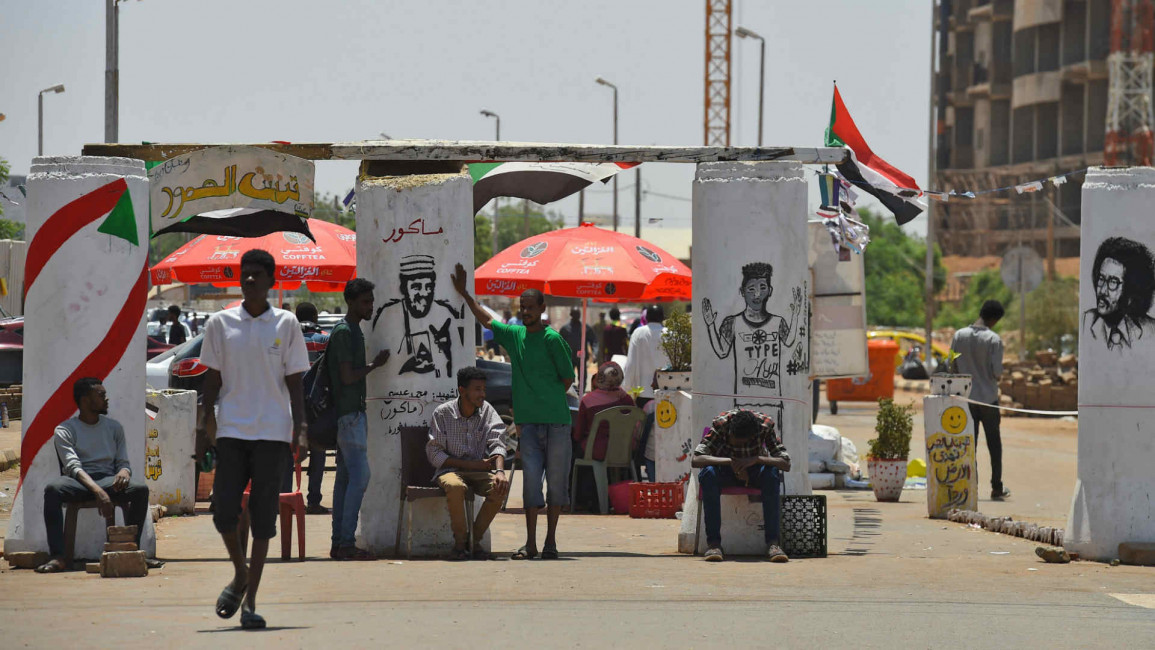US says Sudan army rulers responsible for killing of six people during anti-junta protests
The US embassy in Khartoum on Tuesday blamed Sudan's ruling military council for the deaths of six people in after security forces fired on a sit-in protest in the capital.
"The tragic attacks on protesters yesterday that led to the deaths of at least six Sudanese and potentially one hundred or more injured were clearly the result of the Transitional Military Council trying to impose its will on the protesters by attempting to remove roadblocks," the US embassy said in a statement posted on its Facebook page.
"The decision for security forces to escalate the use of force, including the unnecessary use of tear gas, led directly to the unacceptable violence later in the day that the TMC was unable to control."
Five protesters and a Sudanese army major were killed on Monday just hours after the council's generals and protest leaders said the two sides had reached a breakthrough agreement on who should run the country.
The six were killed by gunshots, which the protest leaders blamed on militias linked to the former regime of ousted president Omar al-Bashir.
The killings took place on Monday night, when protests in Sudan usually swell during the Muslim holy month of Ramadan that is marked by dawn to dusk fasting.
The head of Sudanese military intelligence, General Hudhaifa Abdel Malek, denied that security forces were responsible for the killings, blaming "infiltrators".
The Sudanese Professionals Association said that progress in talks regarding the formation of a joint military-civilian council had led "remnants of the fallen regime" to try to disperse the ongoing protests by force.
The shootings took place one hour after the military council announced that agreement had been reached regarding the structure and make-up of the new council and its associated governance structures.
Hours earlier, Sudanese prosecutors announced that they have charged Bashir with involvement in killing and incitement to kill protesters during the uprising, according to the state news agency SUNA.
Since the military removed Bashir on 11 April, he has been imprisoned in Khartoum. The demonstrators, however, have remained in the streets, demanding the military hand over power to civilians.
'Prosperous future'
Prior to Monday's talks between the military rulers and protest leaders, groups of demonstrators had blocked Nile Street, a major avenue in the city, for the second consecutive day.
Witnesses said angry protesters blocked the avenue after police initially stopped them from going to the sit-in outside the army complex from that road.
|
The military council condemned the protesters for blocking the avenue.
"It is totally unacceptable what is happening on the Nile street as it creates chaos and makes life difficult for citizens," the council said in a statement on Sunday.
In its statement, the US embassy said the two sides "should not allow yesterday's events to prevent them from building on yesterday's progress to rapidly conclude negotiations to establish a civilian-led transitional government".
"We encourage the people of Sudan to continue to express their desire for a peaceful and democratic Sudan in a non-violent manner and to not to be provoked by the actions of those who oppose change," it said.
Washington has consistently pushed the army generals to reach a deal with the protest leaders on handing over power.
Last Wednesday, US Deputy Secretary of State John Sullivan spoke by telephone with General Abdel Fattah al-Burhan, the chairman of the military council, and voiced support for "the Sudanese people's aspirations for a free, democratic and prosperous future", the State Department said.
Sullivan encouraged the military leader to "move expeditiously toward a civilian-led interim government" and to reach an agreement with the Alliance for Freedom and Change protest group.
Follow us on Twitter: @The_NewArab


![President Pezeshkian has denounced Israel's attacks on Lebanon [Getty]](/sites/default/files/styles/image_684x385/public/2173482924.jpeg?h=a5f2f23a&itok=q3evVtko)



 Follow the Middle East's top stories in English at The New Arab on Google News
Follow the Middle East's top stories in English at The New Arab on Google News


